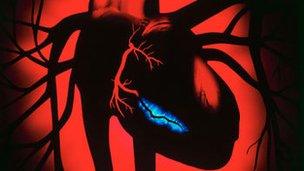Heart attack symptoms 'differ in women'
- Published

Women are more likely to die from a heart attack
Fewer women than men suffering from a heart attack appear to experience chest pain symptoms, according to a study of more than one million people in the US.
Overall men have significantly more heart attacks, but under the age of 55 women are more likely to die from one.
Without displaying the classic chest pain symptoms of a heart attack, researchers say some women may not be getting the right kind of treatment.
The study, external looked at patients seen at more than 1,000 hospitals.
The research found that among younger women - those aged under 55 - the differences in symptoms with men of the same age were striking.
Overall, 42% of women did not experience chest pain compared with 30% of men.
And once admitted, the study found that women were more likely to die than men from the same age group.
Some 14% of women died compared with 10% of men.
The study adds to evidence that women can experience quite different symptoms to men.
Time is critical
The authors, writing in the Journal of the American Medical Association, said: "Optimal recognition and timely management of myocardial infarction (MI), especially for reducing patient delay in seeking acute medical care, is critical.
"The presence of chest pain/discomfort is the hallmark symptom of MI.
"Patients without chest pain/discomfort tend to present later, are treated less aggressively, and have almost twice the short-term mortality compared with those presenting with more typical symptoms of MI."
Heart attacks among younger women are relatively rare.
In fact the average age of women admitted to hospital in the study was 74, compared with 67 for men.
Cathy Ross, senior cardiac nurse at the British Heart Foundation, said a heart attack did not necessarily mean dramatic and excruciating chest pains.
"Symptoms vary; for some the pain is severe and yet others may feel nothing more than a mild discomfort or heaviness. The most important thing to remember is if you think you're having a heart attack, call 999.
"Younger women may need to heed that advice more than most because they appear to be less likely to have chest pains.
"Their symptoms can be overlooked by inexperienced medical staff because heart attacks in young women are rare.
"More research will hopefully identify why there are such variations in the way heart disease affects men and women."
Dr Kevin F Fox, a consultant cardiologist at Imperial College Healthcare NHS Trust and speaking for the Royal College of Physicians, said that overall the number of heart attacks and associated deaths were falling, but that when young women had heart attacks the outcomes were not good.
"The paper has shown that women, and in particular younger women, under 55 years of age, often do not have the typical presenting symptom of chest pain compared to men when they have a heart attack.
"Although heart attack survival is improving overall, doctors, health care professionals and the public need to be aware and vigilant that women can have a heart attack without the typical chest pain that we all think of as the main symptom."
The US researchers describe the results of their work as "provocative" and urge further study, but say that for the moment there should be no change in the public health message that chest pain and discomfort could be symptoms of a heart attack.
- Published11 August 2011
- Published30 November 2010